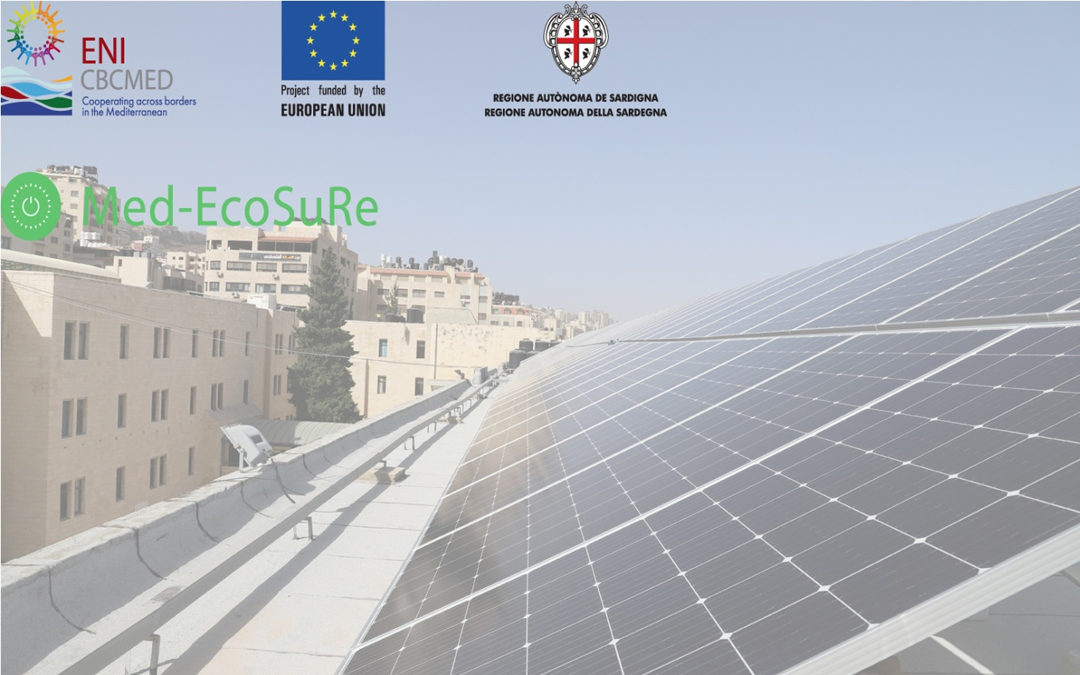Med-EcoSuRe (Université méditerranéenne comme catalyseur de rénovation éco-durable) est un projet financé par l’Union européenne dans le cadre du programme IEV CT MED 2014-2020. Géré par la Région autonome de Sardaigne (Italie), ce programme vise à promouvoir la coopération transfrontalière en Méditerranée.
L’objectif principal du projet est de proposer et de mettre en œuvre des solutions innovantes et éco-durables de rénovation énergétique des bâtiments universitaires méditerranéens, et d’introduire une approche collaborative active pour l’aide à la décision, entre les principaux acteurs impliqués, dans le cadre d’un « Laboratoire vivant ».
Les partenaires de Med-EcoSuRe ont travaillé en étroite collaboration pour atteindre les objectifs du projet. Voici les principales réalisations et résultats obtenus au cours de la première année de mise en œuvre du projet :
Réalisation d’audits énergétiques dans les universités partenaires afin d’analyser le comportement et la consommation énergétique globale des bâtiments, et de formuler des recommandations pour réduire la consommation énergétique ;
Élaboration de formulaires et de modèles standards pour évaluer les caractéristiques des systèmes énergétiques et les modes de consommation énergétique des bâtiments ;
Conception, évaluation et installation de panneaux solaires photovoltaïques raccordés au réseau dans les bâtiments des universités partenaires ;
Conception, évaluation et installation d’une plateforme expérimentale de micro-réseaux intelligents équipée d’un système de gestion de l’énergie ;
Lancement d’une enquête pour identifier des solutions durables de réhabilitation des bâtiments : cinq solutions innovantes ont été sélectionnées pour la rénovation énergétique des bâtiments
Med-EcoSuRe (Mediterranean University as a Catalyst for Eco-Sustainable Renovation) is a project funded by the European Union under the ENI CBC MED 2014-2020 programme. Managed by the Autonomous Region of Sardinia (Italy), this programme aims to promote cross-border cooperation in the Mediterranean.
The main objective of the project is to propose and implement innovative and eco-sustainable solutions for the energy renovation of Mediterranean university buildings and to introduce an active collaborative approach to decision-making among the key stakeholders involved, within the framework of a “Living Lab.”
The Med-EcoSuRe partners worked closely together to achieve the project objectives. The following are the main achievements and results obtained during the first year of the project:
Conducting energy audits at partner universities to analyze the behavior and overall energy consumption of the buildings and formulating recommendations for reducing energy consumption;
Development of standard forms and templates to assess the characteristics of energy systems and building energy consumption patterns;
Design, evaluation, and installation of grid-connected photovoltaic solar panels in partner university buildings;
Design, evaluation, and installation of an experimental smart microgrid platform equipped with an energy management system;
Launch of a survey to identify sustainable building renovation solutions: five innovative solutions were selected for the energy renovation of university buildings (lighting, home automation, heating/air conditioning, façade ventilation, solar energy, energy efficiency, etc.);
Creating synergies with projects sharing the same objectives and priorities as Med-EcoSuRe;
Creating a cross-border Mediterranean living lab, MED beX.Live (Experience the Environment of University Buildings): creating an intermediary entity, a Living Lab, for collaboration between academics, decision-makers, and stakeholders, to support energy managers in planning and implementing innovative sustainable energy measures in higher education buildings;
Launching an expression of interest to identify project stakeholders and their involvement in the Living Lab’s activities, based on their areas of expertise and interests;
Organizing a series of webinars involving ENI CBC Med projects, aimed at stimulating knowledge sharing and stakeholder participation, while addressing various topics and challenges related to public buildings in the Mediterranean;
Creating an ICT platform to facilitate cooperation and co-creation within the MED beX.Live Living Lab community; and ensuring the collection of information between partners and stakeholders, as well as the transfer of knowledge and best practices;
Development of a benchmark university building complex showcasing the higher education real estate portfolio in the Mediterranean;
Development of an “Abacus” database listing existing traditional and innovative solutions adapted to Mediterranean university buildings.
A summary of the first year’s achievements is available here: http://www.enicbcmed.eu/sites/default/files/2020-09/First%20year%20achievements.pdf

